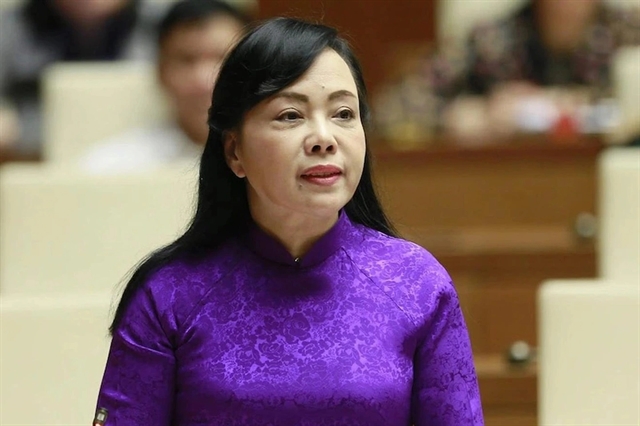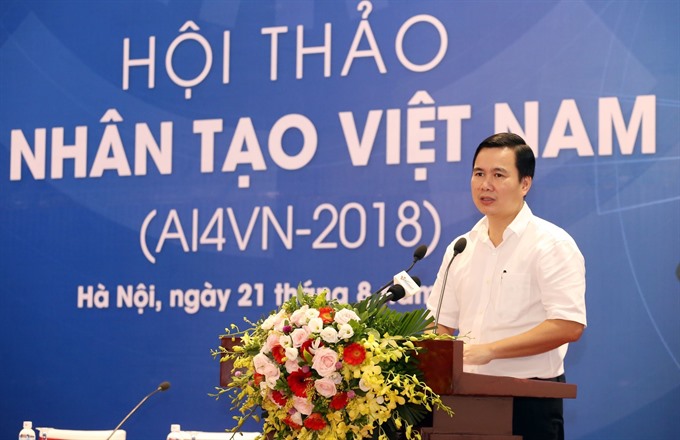 Society
Society

The Government of Việt Nam, together with leading tech companies, are committed to supporting the development of artificial intelligence (AI) in service of the country’s industrialisation and modernisation process.
 |
| Deputy Minister of Science and Technology Bùi Thế Duy affirmed the Vietnamese leadership’s endorsement in a conference yesterday entitled AI4VN held within the framework of the week-long event ‘Connecting Việt Nam Innovation Network’ (August 18-24). — VNA/VNS Photo |
HÀ NỘI — The Government of Việt Nam, together with leading tech companies, are committed to supporting the development of artificial intelligence (AI) in service of the country’s industrialisation and modernisation process.
Deputy Minister of Science and Technology Bùi Thế Duy affirmed the Vietnamese leadership’s endorsement in a conference yesterday entitled AI4VN held within the framework of the week-long event ‘Connecting Việt Nam Innovation Network’ (August 18-24).
The conference gathered over 100 industry-leading AI experts from all over the world, signifying the Vietnamese Government’s wish to take full advantage of the Fourth Industry Revolution’s achievements in nation-building efforts.
Deputy minister Duy said the Government of Việt Nam looks forward to the formation of AI research groups covering relevant areas such as market, data, application deployment, training and basic research and wish that the AI scientists would gather and build a strong network of artificial intelligence thinktanks in Việt Nam, as part of a bigger AI research programme on a national scale.
At the conference, Lê Viết Quốc, who is currently working for Google’s flagship AI project known as Google Brain, said the most important breakthroughs in AI technology were made in the fields of image and speech recognition as well as natural language processing.
Google and Microsoft’s artificial neural networks, for example, have even surpassed humans’ ability in identifying objects since 2016, Quốc said.
He recommended Việt Nam focus on three major tasks – developing human resources, setting up open databases, and expanding connections between Vietnamese universities and international institutions to tap into the global wells of knowledge.
Other notable scientists with international backgrounds present at the conference include Vũ Hà Văn, professor of mathematics at Yale University, CEO of robotics company OhmniLabs and the youngest Vietnamese PhD from Stanford University Vũ Duy Thức, Đỗ Bình Minh, a senior research scientist in robotics at NASA, and Assoc. Prof. Nguyễn Lê Minh, a deep learning technology researcher at the Japan Advanced Institute of Science and Technology.
The conference recorded ample ideas and proposals from scientists and researchers on how to develop the AI industry in Việt Nam, what areas to prioritise, and what could be Việt Nam’s own flagship AI products, as well as the development of resources – from finance, infrastructure to capacity building – for the robust development of AI technology in the country.
Catching the wave
Since the 1970s, in the tumultuous aftermath of the American War, the first seeds of artificial intelligence research were sown in Vietnamese academia as it was made a subject for IT students in a few universities around the country.
In the 1980s, Việt Nam has had its first AI appliance – the VnDOCR software, which identifies Vietnamese letters from printed documents.
Nguyễn Thanh Thuỷ, deputy director of the University of Engineering and Technology under the Việt Nam National University – Hà Nội, said AI could help obtain the answers for hitherto ‘unknowable’ issues by analysing big data.
“Take the increasing rate of cancer deaths in Việt Nam for example, the factors and causes of cancer are out of human grasp. But with enough data, computers with artificial brains could help us solve the ‘mysteries’,” Thuỷ said.
Many Vietnamese AI solutions have been deployed and are well-received, including the automated customer care system at the Hà Nội Electricity Corp, the foreign language teaching app for kids Monkey Junior, or the first AI recruitment platform in Việt Nam, TopDev.
However, Vietnamese AI developers don’t focus on bringing flashy features to wow users or compete with products from major AI players, experts said, adding that AI solutions that help boost productivity and reduce time and costs are a popular trend at the moment.
Despite the plethora of research, AI in Việt Nam remains a novel branch of study, but the gap in AI application and research potential between Việt Nam and developed countries is not too large, and it can be bridged by encouraging IT firms to invest heavily into this promising area. — VNS




